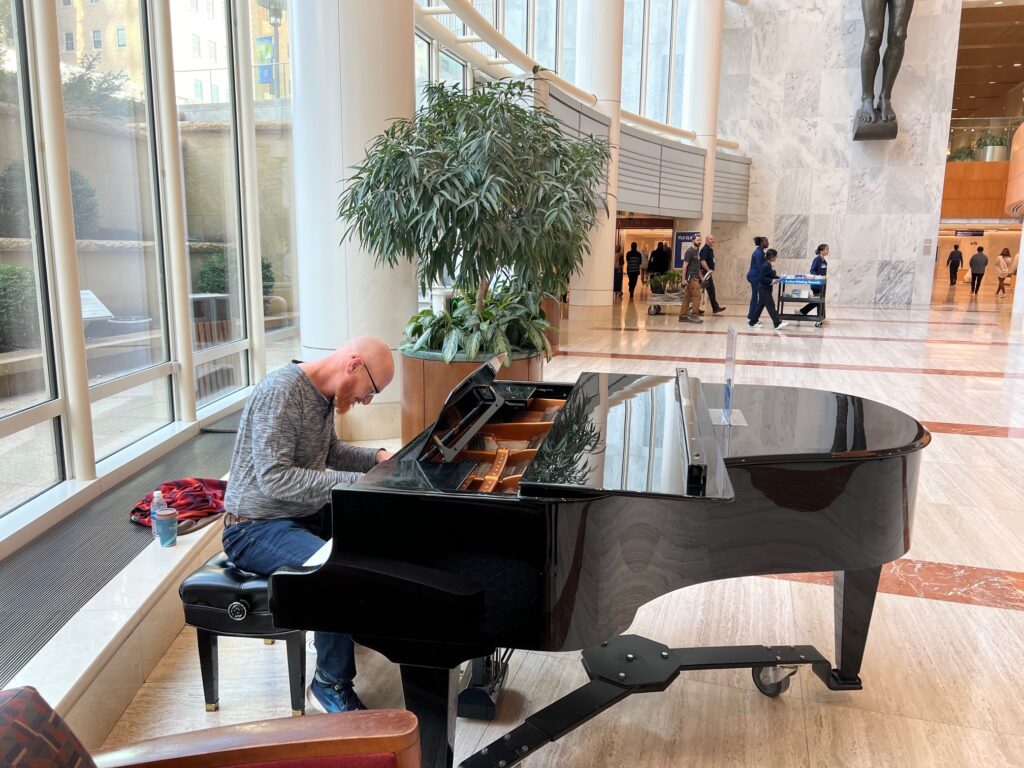Basslines
The rhythmic, pulsating sounds remind me of playing bass guitar at Austin’s School of Rock. Kayla and Chris, my Mayo Clinic MRI specialists, offer unmistakably Midwestern hospitality and assurances.
“You’re doing great,” they say.
I imagine my friends and bandmates at my side—Baker on drums, Rachael on keys, and Jason and Cindy, each strumming a Les Paul. We play and sing while our teachers, Jason and Sage, cheer us on.
It’s been more than 20 minutes since the long metal and plastic MRI tube swallowed my head and torso; the required fare for it to produce images of my brain so valuable for my doctors. I focus on managing my claustrophobia and try to ignore an itchy nose and scalp that I cannot reach to scratch.
Crazy Uncles
I blame all of this on Parkinson’s, the illness that, eight years ago, took up residence in my body. My diagnosing neurologist and now friend, Tom Hill, called it “the new family member.” I have come to liken Parkinson’s to the crazy uncle who shows up uninvited and says, “Pull my finger,” just before farting at the family dinner table.
You try as hard as you can to isolate this family member from whom and what you care about most.
Mayo
Kayla and Chris talk to each other while the MRI tube begins playing a new tune. It reminds me of the bass line in the Cranberries song “Zombie.” My daughter Meredith, also a bandmate, sings this song when our School of Rock band performs. Equal parts angelic and badass, Mer’s singing voice makes me tingle and feel alive. She and her sister, Holly, are sources of my greatest joy and strength.
This is my second trip to Mayo, a destination for excellence in medicine and a place that invites those who are ill and those who love them to come, stand together, hope, and heal. It’s like no other place I have experienced. Its sacred spaces draw exceptionally bright and dedicated doctors, nurses, and other healthcare providers who choose to be there because they embrace Mayo’s primary value: that the patient’s needs come first.
Mayo’s large and inviting atrium, where bright sunlight bathes an elegant grand piano, has been a significant space for me. There, I have watched a nurse ending a long shift in the operating room play Chopin for patients and their families. I have been moved when hearing exhausted family members play their loved one’s favorite hymns. Today, a man plays a jazz piece.
Watching the bald and bearded man play, not only with his hands but with his entire body making large, pronounced movements, his eyes mainly shut and meditative, I linger in my experience of humanity’s collective desire to share our lives. I think of our tendency to need others in times of great joy and sorrow. Mayo and its people capture this same desire.
As the pianist plays, scores of Mayo staff circle those who need them. In a similarly meditative way, they act with a measure of hospitality, warmth, and humanity that we need more of in the world and certainly in healthcare. These devoted healers offer humans from all over the globe embodied examples of what medicine can and should be–for all of us.
Each person who enters Mayo’s hallowed rooms and corridors—many of their walls replete with histories of saintly nurses and physicians called there to attend to bodies and souls, to care for individuals and families—these hallowed spaces invite patients and their crazy uncles to come, just as they are, in the fullness of their humanity, with their worries and insecurities, and with no need for hiding or embarrassment.
With each visit to Mayo, I am reminded that we all have similar basic needs. These include a need for care and support, encouragement, and hope. We must also make meaning in life, discover our callings and purposes, figure out illness’s significance, live with courage, and build resilience. Spending time at Mayo and places like it fosters precisely this discovery.
We also need one another and benefit from opening ourselves up and offering others our most authentically human selves. We help each other when sharing our experiences, including experiences of great joy, but especially when we face significant disappointments and losses. Sharing takes many forms, from the professional healer who offers encouragement to the patient locked into the MRI tube to the lay pianist sharing his talent and joy for living in the form of jazz.
Being at Mayo reminds me that everyone has a crazy uncle who complicates and disrupts their lives, or they will someday. These family members’ presence helps keep us mindful of how fragile life can be and of the value of each day.
Today’s visit to Mayo reminds me of something more.
No crazy uncle or anyone else has to ruin the songs that I, or those I love, want to play and sing.
__________
Allan Cole is Dean of the Steve Hicks School of Social Work at The University of Texas at Austin, where he also serves as the Bert Kruger Smith Centennial Professor in Social Work and as Deputy for Health Humanities and Technology and Professor of Psychiatry and Behavioral Sciences at the Dell Medical School. Diagnosed with Parkinson’s in 2016 at the age of 48, he is the author or editor of 15 books on a range of topics related to chronic illness, bereavement, anxiety, and spirituality. His latest books are Jumping to the Skies: Additional Lessons from Parkinson’s Disease (Cascade, 2023) and Riding the Wave: Poems (Resource Publications, 0ff-press soon). Other recent books include Discerning the Way: Lessons from Parkinson’s Disease (Cascade), In the Care of Plenty: Poems (Resource Publications), and Counseling Persons with Parkinson’s Disease (Oxford University Press). With filmmaker and his creative partner Vanessa Reiser, his documentary titled “The Only Day We Have” aired in April of 2024 on PBS. You may watch it here.

